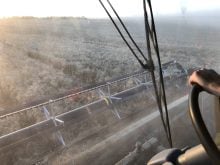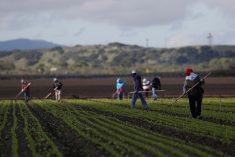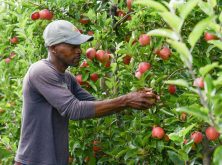Some pork groups across the Prairies are concerned about Ottawa’s immigration plan.
On Oct. 24, the federal government said it will revise immigration levels beginning in 2025 and continuing into 2027.
Cam Dahl, general manager of the Manitoba Pork Council, recently wrote a letter on the issue to Marc Miller, federal minister of immigration, refugees and citizenship. He said the federal plan could have a negative impact on his sector.
Read Also

Trade uncertainty, tariffs weigh on Canadian beef sector as market access shifts
Manitoba’s beef cattle producers heard more about the growing uncertainty they face as U.S. tariffs, and shifting trade opportunities, reshape their market.
“Access to skilled labour has been a top priority for Manitoba’s pork sector for several years,” wrote Dahl. “This applies to all links in the value chain, from hog producers to the trucking industry and through to processors.”
Why it matters: Canada has announced plans to tighten immigration and has also been cracking down on the temporary foreign worker program that agriculture has typically relied on to fill labour gaps.
The federal government said it wants to limit the number of temporary residents in Canada, including workers and students. At the same time, the immigration department said Oct. 24 that it wants more temporary residents, including workers and students, to become permanent residents of Canada.
Agriculture has an often-cited labour shortage. A February report from the Canadian Agricultural Human Resource Council said that, even with foreign labour filling 40 per cent of jobs, there would be 22,200 vacant positions in 2030.
The same report noted that fruit and vegetable sectors, which commonly use temporary foreign workers, are expected to see the worst of the shortage, with 35,000 positions projected to be vacant during the 2030 peak season.
Manitoba producers and industry stakeholders have brought in new Canadians to fill vacant positions and ensure sustainable production and processing, Dahl said.
“In particular, the Manitoba Provincial Nominee Program has been successful in matching new Canadians with sustainable full-time work in Manitoba.”
That program allows the province to recruit skilled immigrants and put them on the path to permanent residency.
Mark Ferguson, general manager of Sask Pork, echoed some of Dahl’s concerns.
“Immigration is very important to our industry, both at the farm and plant level,” he said. “Any changes to the numbers for how many workers are allowed in under the skilled worker program is concerning to us.”
Saskatchewan has an Immigrant Nominee Program used by all parts of the pork value chain to recruit and retain staff in areas where they have difficulty finding workers, Ferguson said.
“That program is very important to us. The limits on it are set through federal policies.”
He added that maintaining or expanding the number of skilled workers is key to the industry and two pork processing plants in Moose Jaw rely heavily on foreign workers.
“Most of the people that are recruited in our industry are recruited as long-term employees,” he said. “Basically, there’s a path to citizenship for people joining the pork industry in Saskatchewan.”
Temporary labour
In March, the federal government adjusted the Temporary Foreign Worker Program and reduced the maximum number that a business could employ from 30 to 20 per cent of their staff.
Those changes were disruptive for meat packers across Canada, which rely heavily on foreign workers, said Lauren Martin, senior director of government relations and policy with the Canadian Meat Council. The meat industry eventually adjusted to the cap.
Martin said federal ministers and bureaucrats understand that agriculture needs a consistent supply of foreign workers. Pork producers, fruit and vegetable growers, beekeepers and others rely on foreign labour to operate their businesses.
Dahl wrote that the Manitoba Pork Council understands current pressure on housing and public services in urban centres, aspects that drove Ottawa’s tone on immigration. However, pressures in rural Canada are not the same, he wrote.
He said provinces are best positioned to manage labour requirements in their region, and immigration needs should be assessed on a regional basis. Use of the provincial nominee program should be expanded as part of a broader re-alignment of immigration policy, he wrote.
“At a bare minimum, the reduction in immigration numbers announced on Oct. 24 should not apply to the (provincial nominee program).”
















